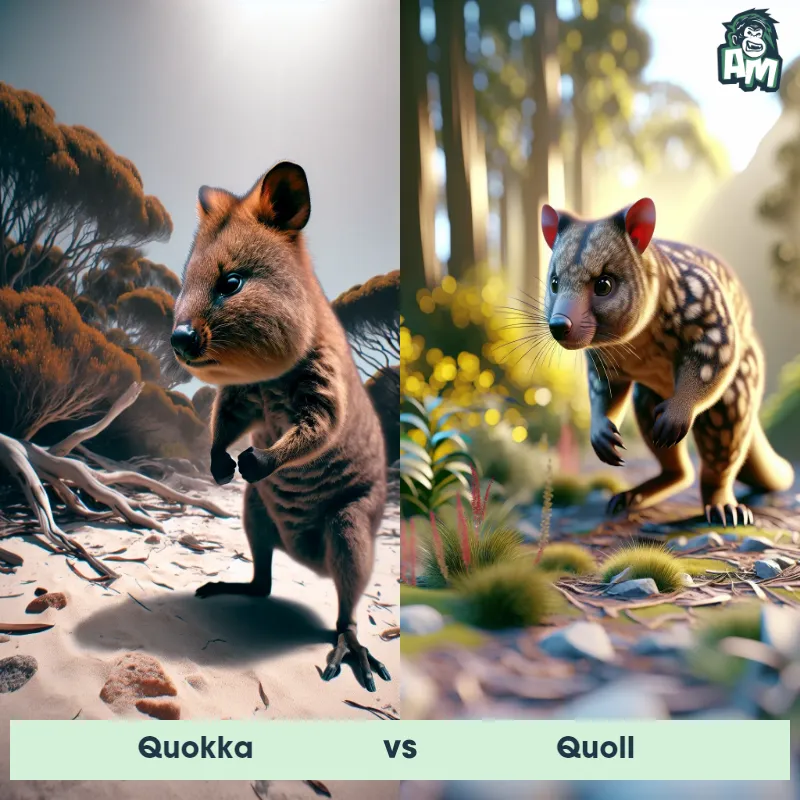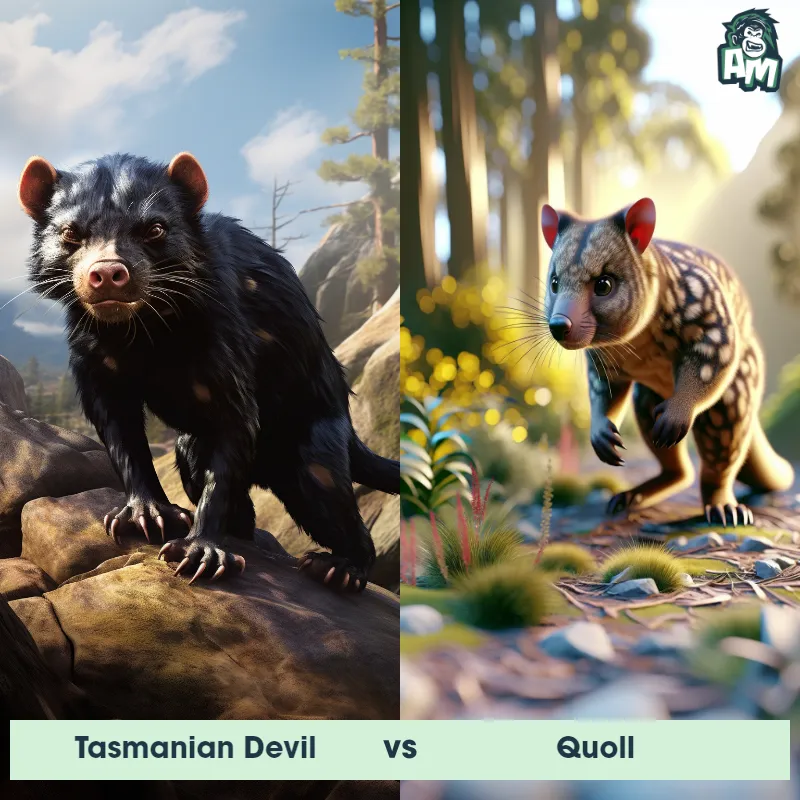The Quoll
The Quoll, also known as the native cat, is a small to medium-sized marsupial found in Australia, Papua New Guinea, and Tasmania. Quolls have compact bodies and a distinctive spotted pattern on their fur, which varies in color from reddish-brown to black. They have a pointed snout, sharp teeth, and a long tail. Quolls are agile climbers and have strong jaws, which they use to catch their prey. They are nocturnal animals, spending their days in dens and venturing out at night to hunt for insects, small mammals, reptiles, and birds.

| Quoll | |
|---|---|
| Size | 23-66 cm (9-26 in) in body length; 20-35 cm (8-14 in) in tail length |
| Weight | 300-1,600 grams (0.7-3.5 lbs) |
| Speed | 12mph (19km/h) |
| Key Strength | Sharp teeth and claws |
| Biggest Weakness | Small size and lightweight |
| Scientific Name | Dasyurus (Quolls) |
| Family | Dasyuridae |
| Habitat | Forests, woodlands, grasslands, and coastal areas. |
| Geography | Australia, Tasmania, and New Guinea |
| Diet | Carnivorous, feeding on insects, small mammals, birds, reptiles, and fruit. |
| Lifespan | 4 years - 7 years |

The Quoll
The Quoll, also known as the native cat, is a small to medium-sized marsupial found in Australia, Papua New Guinea, and Tasmania. Quolls have compact bodies and a distinctive spotted pattern on their fur, which varies in color from reddish-brown to black. They have a pointed snout, sharp teeth, and a long tail. Quolls are agile climbers and have strong jaws, which they use to catch their prey. They are nocturnal animals, spending their days in dens and venturing out at night to hunt for insects, small mammals, reptiles, and birds.
Fun Fact: Quolls are known for their unique ability to eat poisonous animals such as venomous reptiles and toxic toads without getting sick.
| Quoll | |
|---|---|
| Size | 23-66 cm (9-26 in) in body length; 20-35 cm (8-14 in) in tail length |
| Weight | 300-1,600 grams (0.7-3.5 lbs) |
| Speed | 12mph (19km/h) |
| Key Strength | Sharp teeth and claws |
| Biggest Weakness | Small size and lightweight |
| Scientific Name | Dasyurus (Quolls) |
| Family | Dasyuridae |
| Habitat | Forests, woodlands, grasslands, and coastal areas. |
| Geography | Australia, Tasmania, and New Guinea |
| Diet | Carnivorous, feeding on insects, small mammals, birds, reptiles, and fruit. |
| Lifespan | 4 years - 7 years |
Quoll Matchups
We use AI to simulate matchups between the Quoll and other animals. Our simulation considers size, strength, and natural predatory behaviors to determine the most likely outcome.
Quoll: Diet, Predators, Aggression, and Defensive Behaviors
What do Quolls eat?
Quolls are carnivorous marsupials that primarily hunt at night. They have a varied diet that includes insects, birds, small mammals, reptiles, and even some vegetation. Quolls are opportunistic feeders and will eat whatever prey is available to them.
Do Quolls have any predators?
Quolls face threats from larger predators such as feral cats, foxes, and birds of prey. These predators are known to target both adult quolls and their young, making survival a constant challenge for these small marsupials.
Are Quolls aggressive?
Quolls are generally solitary and territorial animals, but they are not known to be aggressive towards humans. However, they may become defensive if threatened or cornered, and may bite or scratch as a means of self-defense.
Do Quolls fight with each other?
Quolls are known to be quite territorial and will defend their home ranges from intruders. When two quolls encounter each other, they may engage in aggressive behaviors such as vocalizations, posturing, and physical combat. These fights can be intense but are usually used to establish dominance rather than to inflict serious harm.
How do Quolls defend themselves?
Quolls have several defense mechanisms to protect themselves from predators. When threatened, quolls will emit a strong musky scent from their scent glands as a warning signal. They may also use their sharp teeth and claws to bite and scratch if necessary. Additionally, quolls are agile climbers and may seek refuge in trees to escape danger.
What is the Quoll's biggest weakness in a fight?
Despite their sharp teeth and claws, quolls are relatively small in size compared to some of their predators. This puts them at a disadvantage in physical confrontations with larger animals. Quolls rely on their agility and quick reflexes to evade attacks and survive in the wild.
Fun Fact: Unlike most marsupials, Quolls have a shorter gestation period, with the young being born after just 21 days and then continuing their development in their mother's pouch.
Fun Fact: Some species of Quolls, such as the Eastern Quoll, have a unique way of attracting mates. The males produce a strong-smelling scent from a gland near their tail, known as the "sternal gland," which intrigues and attracts females during breeding season.













